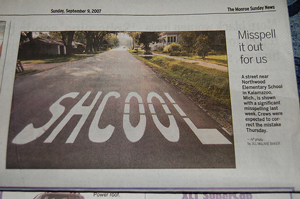
Source: DLDwomen Conference Day2, Hubert Burda Media, Flickr
As mentioned at the beginning of this lesson, writers sometimes use irony to help produce their desired tone. Irony creates meaning that seems to contradict the literal meaning or events. While different types of irony exist, this section will focus on situational irony (when the actual situation is quite different from that presented) and verbal irony (when the intended meaning is contrary to the literal meaning).
In 1996, Alanis Morissette had a hit song called “Isn’t It Ironic?” The lyrics of this song include a number of examples that Morissette claims are ironic. She took a lot of flak for this song because some of the things she mentions as being “ironic” are really just a matter of bad timing or bad decision making. For example, she sings about “rain on your wedding day,” “good advice that you just didn’t take,” and “a traffic jam when you’re already late” and implies that these events are ironic. While these occurrences are not necessarily positive, they don’t qualify as a “contradiction of literal meaning or events”—which must happen for irony to occur.
Some of Morissette’s examples, however, do exemplify irony. In her song, the man who was afraid to fly finally forced himself to get on a plane, and it crashed. It is ironic that the man who fears flying finally works through his fear—probably by convincing himself of how safe flying is—and ends up dying in a plane crash.
Unlike the previous section on diction, irony isn’t usually one word that stands out. Writers create situational irony by contradicting or upending the expectations of their readers. As with many other types of writing, writers of nonfiction often use irony in their writing.
The next excerpt, which is from an Atlantic Cities article by Eric Jaffe, contains a great example of situational irony.

Source: Book Burning Party Troy Public Library, Leo Burnett Advertising Agency, Facebook page
Safeguarding American Families printed up signs that said: “Vote to close Troy library Aug. 2nd, Book burning party Aug 5th.”
They planted them on lawns. When the signs got torn up, they replaced them with new ones. . . .
Needless to say some people got a little angry. They left comments on the committee’s social media sites like “You people are sick” and “This is disgusting” . . . and the like. Local leaders took notice. Then newspapers. Then TV stations. Everyone filed the story under fact.
Actually it belonged in fiction. The whole thing was a hoax. Safeguarding American Families was an invention of the Leo Burnett advertising agency, which had been hired to create a blitz media campaign that would encourage voters to turn out and approve the library-funding proposal. Just before the election, Safeguarding American Families revealed its true message: “A vote against the library is like a vote to burn books.”
Sure enough, come August 2, voter turnout hit 38 percent and the library proposal passed with 58 percent of the ballot. . . . Somewhere, Ray Bradbury is smiling.
What is the situational irony here? The campaign to save the library posted this slogan: “Vote to close Troy library Aug. 2nd, Book burning party Aug 5th.” You would not expect anyone who is trying to save a library to post a sign suggesting the burning of books. This is situational irony. Later on, people realized that the ad campaign was intended to make them care about the library, and it worked. Eventually, the townspeople voted to save their library.
By the way, did you wonder why “Ray Bradbury is smiling”? It could be because he wrote the book Fahrenheit 451 about the burning of books and, in this case, the idea of burning of books had an unexpected and positive result—not what he’d expect.
 Here’s another example that contains situational irony. It comes from “Outlaw,” an essay written by Jose Antonio Vargas. Vargas is a contemporary Pulitzer Prize-winning journalist who recently admitted that he is not a United States citizen, stunning his friends and colleagues. Using your notes, identify the irony in the following excerpt:
Here’s another example that contains situational irony. It comes from “Outlaw,” an essay written by Jose Antonio Vargas. Vargas is a contemporary Pulitzer Prize-winning journalist who recently admitted that he is not a United States citizen, stunning his friends and colleagues. Using your notes, identify the irony in the following excerpt: 
Source: Jose Antonio Vargas Speaks, Campus Progress, Flickr
Over the past fourteen years, I’ve graduated from high school and college and built a career as a journalist, interviewing some of the most famous people in the country. On the surface, I’ve created a good life. I’ve lived the American dream.
But I am still an undocumented immigrant. And that means living a different kind of reality. It means going about my day in fear of being found out. It means rarely trusting people, even those closest to me, with who I really am. It means reluctantly, even painfully, doing things I know are wrong and unlawful.
Even though Vargas has worked hard, is quite successful, and has portrayed himself as a product of the American dream, he is, in fact, an “undocumented immigrant.” His actual situation is contrary to what seemed to be his situation.
 Irony can also occur in other media. Look at the picture below and use your notes to describe the irony it displays.
Irony can also occur in other media. Look at the picture below and use your notes to describe the irony it displays.
Source: Monroe Evening News, Greg-ography, Flickr
It is ironic that the word “School” is misspelled because a school is the place where one goes to get an education and learns to spell.
It is sometimes difficult, as in the Alanis Morissette song, to tell the difference between situational irony and just a strange circumstance. When trying to determine whether a situation is ironic or not, ask yourself the following questions:
- Is it an example of extremely bad luck?
- Is it just an amusing coincidence?
If the answer is yes, then you have likely not found an example of situational irony.
Earlier in this section, we mentioned verbal irony. Read the following quotation:
“I confess I have often my doubts whether [my writing] is of any use to you.”
This is the first line of Chesterfield’s letter to his son. He says that he is doubtful about his advice helping his son. In this quotation, Chesterfield is making it seem like his words aren’t as important as they really are, but even more than understating his words, the quotation is ironic because Lord Chesterfield wrote extensively and was considered something of a go-to person when it came to getting advice.